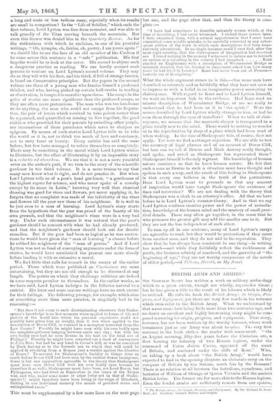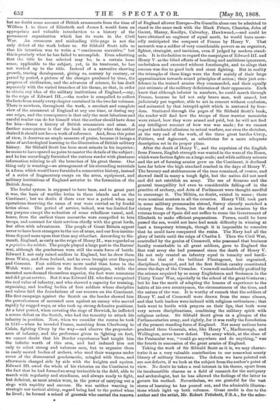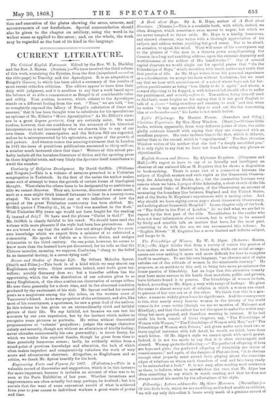BRITISH ARMS AND ARMIES.i' SIR SIBILUD Scorr has written a
work on military archaeology which to a great extent, though not wholly, supersedes Grose but he has given a title to the result of his labours which is likely to mislead. He calls lila book the British Army ; its Origin, Pro- gress, and Equipment, yet there are very few words in his volumes which even refer to the British Army. What we understand by that name came into being little more than two centuries ago, and no doubt an excellent and highly interesting story might be com- posed narrating its origin, progress, and equipment. That story, however, has not been written by the worthy baronet, whose work terminates just as our Army was about to arise. The very first sentence in the book strikes the reader with amazement. "On an August morning, fifty-five years before the Christian era, a fleet bearing the infantry of two Roman legions, under the command of Caius Julius Caner, appeared off the coast of Britain, and anchored under the cliffs of Kent." Who, on taking up a book about "the British Army," would have expected to find in the opening chapters an elaborate essay on the conquest of Britain by the Saxons, much less by the Romans! There is no relation at all between the battalions, squadrons, and batteries of William of Orange or Queen Victoria and the ancient British levies. The former are far more akin to the Roman legions. Even the feudal armies are sufficiently remote from our system,
The British Army: fie Origin, l'rogress, ant Equipment. By Sir Sibbald D. Scott Bart., &c. London : CsseU, Patter, and Cialpiu.
but no doubt some account of British armaments from the time of William I. to those of Elizabeth and James I. would form an appropriate and valuable introduction to a history of the permanent organization which has its roots in the Civil War. An erroneous and misleading title-page is not the only defect of the work before us. Sir Sibbald Scott tells us that his intention was to write a "continuous narrative," but this is precisely what he has failed to accomplish. Even admitting that the title he has selected may be, in a certain loose sense, applicable to the subject, yet, in its treatment, he has not worked up to the title. Instead of a narrative showing growth, tracing development, giving us, century by century, or period by period, a picture of the changes produced by time, the progress of civilization, and the advances of science, he has dealt separately with the varied branches of his theme, so that, in order to obtain any idea of the military institutions of England,—say, in the reign of Edward Ill.,—the reader is compelled to collect thefacts from nearly every chapter contained in the two fat volumes. There is nowhere, throughout the work, a succinct and complete view of the armament of England at any one time, or during any one reign, and the consequence is that only the most laborious and careful reader can do for himself what the author should have done for him—frame a history of British armaments and arms. A further consequence is that the book is exactly what the author desired it should not be—a work of reference. And, from this point of view, it deserves an ample measure of praise, because it brings a mine of archwological learning to the illustration of British military history. Sir Sibbald Scott has been most minute in his inquiries ; he seems to have spared no pains to master the details of the subject; and he has accordingly furnished the curious reader with plenteous information relating to all the branches of his great theme. One thing only is wanting—an arrangement of his abounding materials in a form which would have furnished a consecutive history, instead of a series of fragmentary essays on the arms, equipment, and military institutions of England anterior to the formation of the British Army.
The feudal system is supposed to have been, and in great part it was, the basis of warlike levies in these islands and on the Continent ; but we doubt if there ever was a period when any operations deserving the name of war were carried on by feudal levies alone. The period of service, indeed, was too limited for any purpose except the reduction of some rebellious vassal, and, hence, from the earliest times monarchs were compelled to hire troops, and contract for their services chiefly with the great lords, but often with adventurers. The people of Great Britain appear never to have been strangers to the use of arms, and our free institu- tions depend more upon that than any otherfact. According to Sis- mondi, England, as early as the reign of Henry II., was regarded as a pepiniere des soldats. The people played a large part in the Barons' war, although the gendarmes were still the main force of battle. Edward I. not only raised soldiers in England, but he drew them from Wales, and from Ireland, and he even brought over Basques and Gascons. Foot soldiers were more useful than horse in the Welsh wars ; and even in the Scotch campaigns, while the mounted men deemed themselves superior, the foot were numerous and did great service. But it was Edward III. who first recognized the real value of infantry, and who showed a capacity for training, organizing, and leading bodies of foot soldiers whose discipline and valour laid the foundations of our renown on the Continent. His first campaign against the Scotch on the border showed him the powerlessness of mounted men against an enemy who moved rapidly by rugged ways, or who took up strong defensive positions. At a later period, when covering the siege of Berwick, he inflicted a severe defeat on the Scotch, who had the temerity to attack his infantry in position. Now, when we consider the course he took in 1346—when he invaded France, marching from Cherbourg to Calais, fighting Crecy by the way—and observe the preponder- ance of infantry, and the preference given to 5ghting on foot, we cannot doubt that his Border experiences %ad taught him the infinite worth of this arm, and had induced him not only to select strong and valorous men, but to organize them in easily moved bodies of archers, who used their weapons under cover of the dismounted gendarmerie, mingled with them, and afterwards charged side by side with the knights and squires. Edward III, owed the whole of his victories on the Continent to the fact that he had formed an army invincible in the field, able to march with regularity and steadiness, and always ready to fight, but deficient, as most armies were, in the power of carrying out a siege with rapidity and success. He was neither wanting in strategic nor tactical ability, regard being had to the period when he lived ; he formed a school of generals who carried the renown of England all over Europe—Du Guesclin alone can be admitted to stand in the same rank with the Black Prince, Chandos, John of Gaunt, Manny, Knollys, Calverley, Hawkwood,—and could he have obtained an engineer of equal merit, he would have assur- edly anticipated the conquest of France by Henry V. That monarch was a soldier of very considerable powers as an organizer, fighter, strategist, and tactician, even if judged by modern stand- ards. It is the fashion to regard the campaigns of Edward III. and Henry V. as the blind efforts of headlong and ambitious ignorance, undertaken and executed without forethought, and to allege that success was due to good luck and stout lighting. But in reality the triumphs of these kings were the fruit mainly of their large approximation towards sound principles of action ; their just con- fidence in the trained armies they commanded, and their equally just estimate of the military deficiencies of their opponents. Each knew that although inferior in numbers, he could march through France, because he led not only brave men, well armed, but judiciously put together, able to act in concert without confusion, and animated by that intrepid spirit which is nurtured by free- dom. Scattered through the pages of Sir Sibbald Scott's book, the reader will find how the troops of these warrior monarchs were raised, how they were armed and paid, but he will not find any intelligent account of how war was made ; for we cannot regard incidental allusions to actual warfare, nor even the sketches,. at the very end of the work, of the three great battles Crecy, Poitiers, and Agincourt, as substitutes for a more adequate description set in its proper place.
After the death of Henry V., and the expulsion of the English from France, English strength was wasted in the wars of the Roses, whichwere faction fights on a large scale; and while military science and the art of forming armies grew on the Continent, it declined here far below the high standard reached in the days of Henry V. The bravery and stubbornness of the race remained, of course, and showed itself in many a tough fight, but the nation did not need and did not establish an army. The use of firearms and the general tranquillity led even to considerable falling-off in the practice of archery, and Acts of Parliament were thought needful to encourage it. The Militia, no doubt, existed in name ; there were nominal musters in all the counties. Henry VIII. took part in some military promenades abroad, Surrey cleverly snatched a. victory from the Scots, but the dread of an invasion by the veteran troops of Spain did not suffice to rouse the Government of Elizabeth to make efficient preparations. Parma, could he have passed the sea, would not have had much difficulty in winning at least a temporary triumph, though it is impossible to conceive that he could have conquered the realm. The Navy had all the glory of battle until the reign of Charles I. Then the Civil War, controlled by the genius of Cromwell, who possessed that business faculty remarkable in all great soldiers, gave to England the first real army she had possessed since the death of Henry V. He not only created an infantry equal in tenacity and hardi- hood to that of the brilliant Plantagenet, but organized, disciplined, inspired, and led the first British cavalry constituted since the days of the Crusades. Cromwell undoubtedly profited by the science acquired by so many Englishmen and Scotsmen in the Thirty Years' War, especially in the school of the great Gustavus ; but he has the merit of adapting the lessons of experience to the habits of his own countrymen, the circumstances of the time, and the nature of the war. It is worthy of remark that the soldiers of Henry V. and of Cromwell were drawn from the same classes, and that both leaders were imbued with religious enthusiasm ; that both went to battle with prayers on their lips, that both were very severe disciplinarians, combining the military spirit with religious ardour. Sir Sibbald Scott gives us a glimpse of the Parliamentarian army, and rightly, for it was really the foundation of the present standing force of England. Not many nations have produced three Generals, who, like Henry V., Marlborough, and Wellington, never knew defeat. The army which, at the close of the Peninsular war, "could go anywhere and do anything," was the fourth in succession of the great armies of England.
Taking the work of Sir Sibbald Scott as it is, we may charac- terize it as a very valuable contribution to our somewhat scanty library of military literature. The defects we have pointed out are not defects, if we look at the subject from the author's point of view. No doubt he takes a real interest in his theme, apart from its inexhaustible charms as a field of research for the antiquary and archzeologist, but he has allowed the feelings of the latter to. govern his method. Nevertheless, we are grateful for the vast stores of learning he has poured out, and the admirable illustra- tions which light up both volumes. Great credit is due to the author and the artist, Mr. Robert Pritchett, F.S.A., for the selec- tion and execution of the plates showing the arms, armour, and accoutrements of our forefathers. Special commendation should also be given to the chapter on artillery, using the word in its widest sense as applied to fire-arms ; and, on the whole, the work may be regarded as the best of its kind in the language.
































 Previous page
Previous page